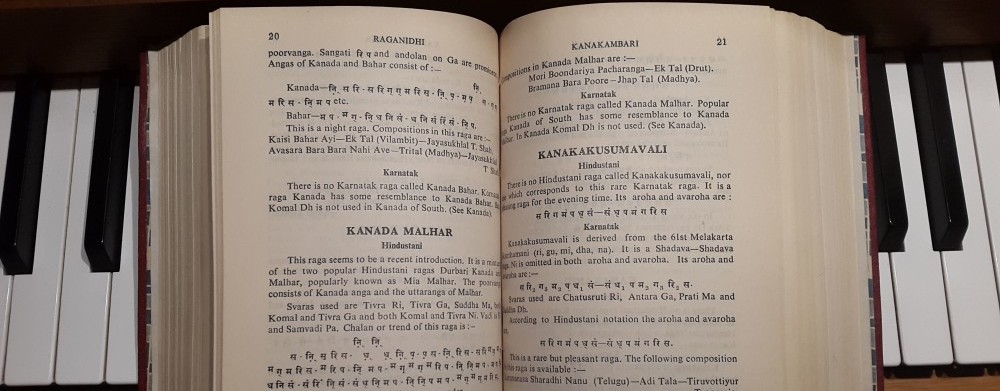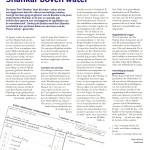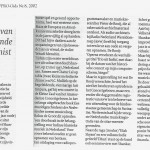Eén van de grootste Indiase musici aller tijden is zonder twijfel sitarspeler Ravi Shankar (1920-2012). In 2002 besteedde de Concertzender in een door mij samengestelde aflevering van het programma Metamorfosen aandacht aan de beroemde sitarspeler die dankzij de Beatles in de jaren zestig een supersterstatus verwierf.
Ravi Shankar heeft een enorm belangrijke rol gespeeld als ambassadeur van de Indiase muziek. De titel van de uitgezonden special – ‘Echo’s van Ravi Shankar en de sitar-explosie in het Westen’ – is niet overdreven. De optredens van Ravi Shankar veroorzaakten destijds een ware sitar-rage en brachten de westerse belangstelling voor Indiase ragamuziek in een stroomversnelling.
In deze uitzending zijn onder andere unieke, door Radio Nederland Wereldomroep gemaakte opnamen van Ravi Shankar te horen uit 1957. Dankzij nauwgezette research werden deze oudste Nederlandse omroepopnamen van Ravi Shankar in januari 2002 ontdekt door Pieter de Rooij, die destijds werkzaam was bij de Wereldomroep als audio-archivaris. Voor meer informatie over de vondst van de Ravi Shankar-opnamen in het Wereldomroep-archief kun je dit artikel en deze video raadplegen.
Samenstelling, tekst en produktie: Pieter de Rooij. Presentatie: ?
Tag Archives: Ravi Shankar
R.I.P. Ravi Shankar (7 Apr. 1920 – 11 Dec. 2012)
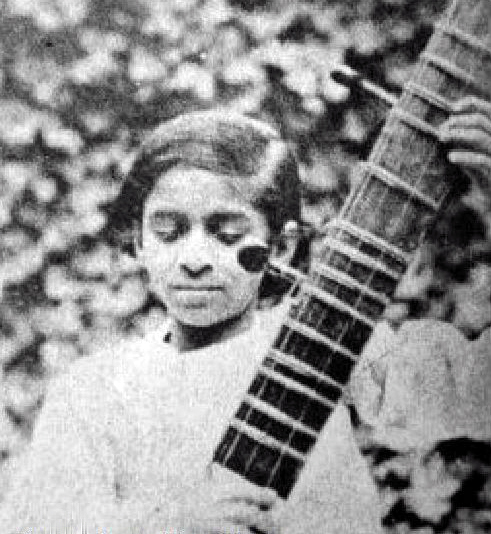
“When I am silent, I fall into the place where everything is music.”
Rumi (1207-1273)
From the Hoboken Collection : Arnold Bake’s radiotalk (script) on Rabindranath Tagore
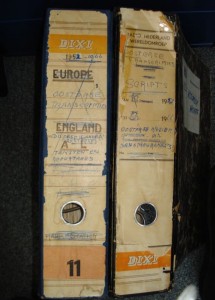
It’s certainly been too long – but better late, than never – since I announced to write on some of the interesting documents I found three years ago at Radio Netherlands from the legacy of Peter van Hoboken (1901-1994), Head of Transcription Service at Radio Netherlands from 1948 to 1966 and one of the great pioneers and promotors of Indian classical music in the Netherlands*. For several decades already there has been another and bigger Van Hoboken-collection that is incorporated in the Felix van Lamsweerde-collection, but most of the material that I came across at Radio Netherlands is different and therefore an interesting addition to the material that was known already.
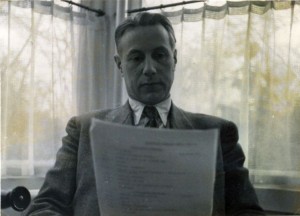
Peter van Hoboken in his office at Radio Netherlands
From here I’d like to refer to these documents as the Radio Netherlands Hoboken Collection, abbreviated as RNHC. My find in January 2002 of a unique recording by Radio Netherlands in 1957 of sitarist Ravi Shankar already illustrated the great value of Peter van Hoboken, who organised this recording. As an adept of Indian classical music and dance Van Hoboken organised recordings of concerts in The Netherlands and he produced many Radio Netherlands programmes on Indian classical music.
At this point I want to proceed with some interesting documents I found among the RNHC, concerning radiotalks done in 1950 by world famous dutch ethnomusicologist Arnold Bake (1899-1963), radiotalks Bake did in english and hindi about the musical life and culture of India, recorded for the Radio Netherlands Transcription Service to be distributed to presumably India and Surinam for broadcasts by stations over there. What I found of these radiotalks is only paperwork, Bake’s typed scripts along with his handwritten corrections. Unfortunately, the recorded tapes can’t be found in the Radio Netherlands Audio Archives, as these were sent to stations outside Holland, the main task of the Transcription Service.
It’s a great pity the recordings of Bake can’t be found in the archives of Radio Netherlands. I’ve asked Felix van Lamsweerde and they’re not in his Van Hoboken Collection. I would assume that they could have been stored in the Arnold Bake Archives, kept at the University of Leiden, but Felix and another expert, Fred Gales, told me that the collection over there contains only papers of radiotalks and not recordings. So, if not in Hilversum and not in Leiden, where can they be? Did the Radio Netherlands Transcription Service sent them to All India Radio and/or to Surinam or are they kept somewhere at the University of London’s School of Oriental & African Studies where Bake lectured? At this point I can’t believe they’re lost. I hope they can be found somewhere, as I’d like to hear how the scripts I found in Hilversum come alive in a radio transmission with Bake’s voice and with the music he talks about.
The radiotalk-script I like to present here contains Bake’s thougths on India’s world famous writer, poet, philosopher and Nobelprize winner Rabindranath Tagore (1861 – 1941), in particular on ‘Tagore and his music’ and when I publish this it’s 7 May 2011, precisely the 150th birthday of Tagore. So, yes, this update on the RNHC took me too long, but I think I’m right on time with presenting these particular papers.
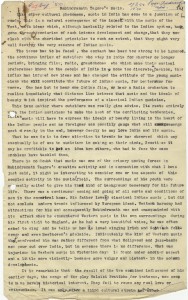
scriptpage 1, click a few times on the photo to enlarge
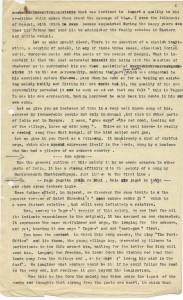
scriptpage 2, click a few times on the photo to enlarge
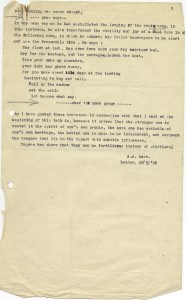
scriptpage 3, click a few times on the photo to enlarge
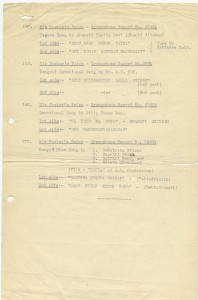
scriptpage 4, click a few times on the photo to enlarge
Let me add that I consider my short writings here on the RNHC as a work in progress. I don’t wanna pretend that I know all the details or have all the answers. That would be stupid and a false claim. If someone sees mistakes or things I overlook or has interesting additional information, please let me know.
* Radio Netherlands and Peter van Hoboken’s son Alexander have given me permission to publish these documents and write about them.
Raga Special in World Minerals (April 29th, 2011) on The CONCERTZENDER
An hour of beautiful raga music by Ravi Shankar (sitar), Parthasarathy Desikan (vocal), Jayanthi Kumaresh (veena) and Vishwa Mohan Bhatt (slide guitar/mohan veena), in Wereldmineralen, Friday April 29th. 2011, 19.00-20.00 (dutch time), a broadcast I’ve produced for The Concertzender.
7 April 2011: Happy Birthday, Ravi Shankar !
Oceanic – Part 1, a beautiful, atmospheric track of Anoushka playing a sitar-duet with her father. Really touching. When I publish this message, it’s 7 April 2011, Ravi Shankar’s 91st birthday. Happy Birthday, Pandit !
Film ‘Raga Unveiled’ sheds light on history and essence of the Hindustani classical musical system
The ambitious film Raga Unveiled, taking a look at the history and essence of the Hindustani classical musical system, has received a lot of praise. Will be screened on Sunday evening, 10 April 2011 at King’s Place in London, as a prelude to the Darbar Festival 2011, on 21 – 24 April 2011, at the same location. Here’s from YouTube a video to promote the film:
Playing around India : A portrait of Dutch cellist Saskia Rao-De Haas (2002)
Playing around India – A portrait of Dutch cellist Saskia Rao-de Haas, a radio documentary by Pieter de Rooij, produced in 2002. [original Dutch title: Op streek in India – een portret van de Nederlandse celliste Saskia Rao-de Haas]
The documentary is mostly in dutch, but this video offers a transcript in english locked to the timetable, in order to make this production accessible for an international audience. To allow convenient reading of this transcript, you should play the video in HD (1080p).
Production date: May-June 2002. First broadcast by Concertzender on 8 November 2002, also broadcast by Radio Netherlands on 25 and 29 December 2002. Voice narrator: Wim Vriezen.
In the documentary ‘Playing around India’ (produced May-June 2002) programme maker Pieter de Rooij introduces the career of the brilliant 31-year-old (that is, in 2002) cellist Saskia Rao-de Haas. She is one of the very few people, and the only European, to play the classical ragas of North India on the cello. She is considered the only genuine cello soloist by the Indian concert going public. Her virtuosity and deep musicality have introduced a new resonance to Indian music and have been enthusiastically receieved by critics and audiences worldwide. To achieve a proper Indian sound Saskia Rao-de Haas plays on a specially modified cello: smaller (so as to be able to be played sitting on the floor), with five instead of the usual four strings, and with ten ‘sympathetic’ strings. These freely resonating strings give a beautiful Indian sound to the cello and the instrument has quickly become very popular.
For two years (speaking from 2002) Saskia Rao-de Haas has lived in New Delhi with her husband, the famous Indian sitar player Shubhendra Rao. As well as traditional raga improvisations, she and her husband play their own compositions in which they mix classical Indian music with elements from European folkmusic and Western classical music.
In May and June 2002 Saskia and Shubhendra toured outside India when, for the first time, Western audiences were able to hear the combination of sitar and cello in Indian classical music. Programme maker Pieter de Rooij caught up with the couple in Amsterdam where they gave a concert at the KIT Tropen Theatre on 25 May. Saskia talks about her music, her cello and her life in India. Her husband Shubhendra, the violin maker Eduard van Tongeren and her former teacher at the Rotterdam Conservatory, Joep Bor, all have something to say about Saskia’s amazing cello adventure. Recordings from the Amsterdam concert are heard during the documentary.
Artikel uit 2002 nav vondst Wereldomroep-opnamen Ravi Shankar uit 1957
Hieronder een stukje dat ik schreef voor het personeelsblad van de Wereldomroep nav mijn sensationele vondst op 4 januari 2002 in het Wereldomroeparchief van tot dan toe anoniem weggeborgen opnamen uit 1957 van Ravi Shankar. Zie hierover ook mijn video op Youtube. Ravi Shankar speelde op maandagmiddag 27 mei 1957 – zo heb ik achterhaald – bij de Wereldomroep twee stukken: Raag Tilak Shyam en een Dhun (volksmelodie), met begeleiding van Chatur Lal op tabla en Nodu Mullick op tanpura. In 2002 heb ik de opnamen laten horen in een door mij geproduceerde special over Ravi Shankar voor De Concertzender en enkele jaren daarna zijn de opnamen ook uitgezonden door de NPS-radio.
Klik op de foto hieronder (en daarna opnieuw om verder te vergroten) om mijn korte artikel te lezen.
In de VPRO-Gids (Nr.8, 2002) werd ook aandacht besteed aan mijn vondst. Klik op de foto hieronder om een kort VPRO Gids-artikel te lezen over een door mij geproduceerde Ravi Shankar radiospecial voor de Concertzender, waarin de historische Wereldomroepopnamen voor het eerst op de radio te horen waren.
Youtube-video on my find of Ravi Shankar recordings from 1957
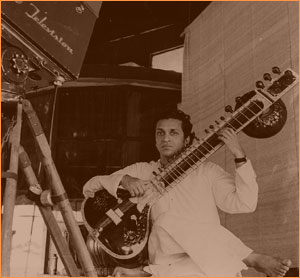 My latest Youtube-video is concerned with a sensational find I did of a recording of Ravi Shankar, made by Radio Netherlands in 1957. I did this find already in January 2002. It might be nice for viewers of my Youtube-channel who are interested in Indian classical music to learn about this interesting historical recording. For more details, see the ‘more info’-section attached to the Youtube-video .
My latest Youtube-video is concerned with a sensational find I did of a recording of Ravi Shankar, made by Radio Netherlands in 1957. I did this find already in January 2002. It might be nice for viewers of my Youtube-channel who are interested in Indian classical music to learn about this interesting historical recording. For more details, see the ‘more info’-section attached to the Youtube-video .